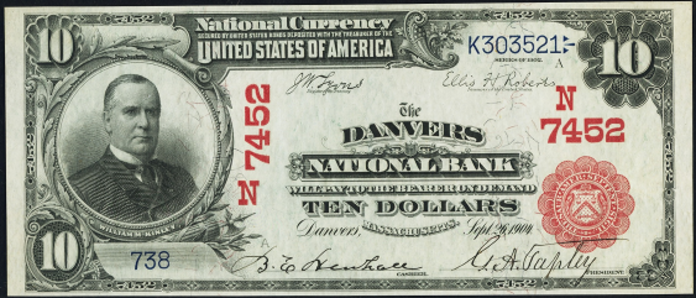Ten Dollar Notes › Nationals › 1902 Ten Dollar National Bank Notes › Pennsylvania Charters › 1902 $10 Sheraden Pennsylvania First National Bank
Get Value Now
| Item | Info |
|---|---|
| Series | 1902 |
| Charter | #5977 First National Bank of Sheraden, Pennsylvania |
| Year Chartered | 1901, 412 Banks Chartered |
| City Info | Sheraden is a neighborhood in Pittsburgh, Pennsylvania in the United States. Nearby neighborhoods include Windgap, Chartiers City, Crafton Heights, Esplen, and Elliott. The neighborhood was named for William Sheraden, a settler who gave land for the construction of a railroad depot in exchange for the naming rights. Sheraden's original homestead still stands at 2803 Bergman Street, easily distinguished for the two sycamore trees which grow together to form an arch, a legacy of Sheraden's horticulturalist grandson. Originally incorporated as Sheraden Borough in 1894, it grew quickly and was annexed by the City of Pittsburgh in 1907. Shortly thereafter, the Public School Board of Pittsburgh opened numerous educational facilities around Sheraden, including Langley High School, completed in 1923, which replaced the former borough's Riverview High School. Source: Wikipedia |
| Similar Cities | City name is unique, no others like it. |
| Seal Varieties | Red, Blue |
| See Also | If your note doesn't match try: 1. 1907 $10 Gold Certificate 2. 1901 $10 Legal Tender 3. 1908 $10 Silver Certificates |
| Other Info | 1. Value depends on notes known for charter, condition and market demand. |
| Neat Fact | Plain Backs issued in sheets of 4 Notes: 3 $10 Notes, 1 $20 Note. Less commonly 4 $20 Notes (Friedbergs, 20th Ed. P131) |
No Obligations Offers and Appraisals
Please submit a good photo or scan. It will be identified and evaluated. Understand there may be subtle differences between the image you see above and your note. Signatures, design, markings and note condition will determine the offer price. Notes in Uncirculated or better condition receive the best offers.
Appraisals can be estimated for wholesale and retail prices. Wholesale is what dealers typically pay. Retail is what a collector might pay. Retail is slightly higher in most cases.
Please visit this page for USA Paper Money Reference. Do not treat this page as a reference guide, it is for appraisal and acquisition purposes only.
